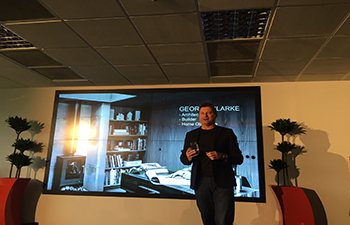Time for transformation

Karen Fletcher reports on a recent seminar that highlighted the links between our need to decarbonise heat while transforming our approach to constructing high-quality, efficient dwellings.
The UK has been relatively successful in the pursuit of lower national carbon emissions. This success story has been driven by the power generation sector, which has been responsible for 75% of our emissions reductions since 2012. However, other sectors now need to follow this pattern if the country is to continue to find much-needed reductions in CO2. One of the main objectives the government now has it to decarbonise our heating – but it’s a lot easier said than done.
There are a number of drivers for change in how we heat our homes and other buildings. Speaking at December’s Mitsubishi Electric seminar on Transforming the housing technology mindset the company’s head of sustainability, Martin Fahey said: “We have been burning fuel for centuries and now it’s time to change. Gas has been reliable for 40 years, but we cannot produce the gas we need in the UK any more. We are importing 57% of our gas already.”
According to the government’s Clean Growth Strategy (October 2017) heating in buildings and industry creates around 32% of total UK emissions. Government identified four main possible approaches, or a combination of these:
 |
| George Clarke speaks about the need for better quality housing and a new approach to construction |
• Electrification
• District heating
• A hybrid approach
• Use of hydrogen or biogas
Those who favour an electrified approach focus on heat pumps as a solution for domestic heating (and the technology is also applicable to commercial projects). Fahey commented: “We feel the future is in the ‘electric economy’. We have just tipped the point where we generate more energy from renewables than fossil fuels. And the UK now generates more electricity from offshore wind than any other country in the world.”
However, the shift away from gas boilers is yet to gain traction, particularly in the housing market. About 1.5 million gas boilers are installed in the UK each year, representing 85% of the UK’s domestic heating market, with heat pumps trailing a long way behind in the single-figure percentages.
This is not simply a case of switching technologies – it involves changing minds too. In spite of success in switching to renewable electricity generation, government has not been consistent in its use of legislation to drive change in building design and use of renewables at the building level. Feed-in Tariffs, Zero Carbon Homes and the Code for Sustainable Homes have fallen by the wayside.
This left the transition to new technologies for home heating in the hands of the private sector, which is slow to change, and the social housing sector which, although it has adopted technologies such as heat pumps, represents only a small fraction of homes being built.
So where does this leave the decarbonising of heating? According to Max Halliwell, communications manager for Mitsubishi Electric heating and ventilation department, the lack of incentives will not hinder a move to heat pumps in our homes.
“There has been a change in the RHI which has seen a 33% tariff increase for heat pumps,” he said. “That comes to an end in 2018, but we don’t need it. What we are left with is the changing way we generate electricity, and the SAP calculations.”
The Standard Assessment Procedure (SAP) calculations are the official way to assess the energy rating for a new home.
These have been updated to reflect the changing way that the UK generates its electricity, specifically because we now use more renewable sources. SAP 2018 set the CO2 emission factor for electricity at 1.519. Draft SAP (2018) puts this figure at 0.233.
 |
|
A vision of the future Martin Fahey, head of sustainability at Mitsubishi Electric, shared his views on what the future might hold for the industry: |
However, SAP numbers mean little to householders, and they are the ones making the choice about their heating systems. Speaking at the Mitsubishi Electric event, TV presenter, architect and builder George Clarke said: “Education is needed because nothing is going to change without it. People need to understand air source heat pumps. Lay people will continue to order a gas boiler until they understand the alternative.”
Speakers at the event also identified another very important issue for the UK, which is the quality of the current housing stock – and the new homes being added to it. The UK’s aging housing stock suffers from poor energy efficiency which would need to be addressed before a change of heating system could be realistically considered. Over 2 million UK households are in fuel poverty and faced with problems heating their homes.
Again, lack of consistent government policy has hindered change. The Committee on Climate Change has criticised the government for allowing a 95% decrease in housing insulation installations caused by reduced budgets for the incentive scheme.
George Clarke expressed little faith in the UK’s largest housebuilders: “We need to build new homes, but the industry is not set up to produce 300,000 new homes a year. What worries me more though is the quality of those homes. Housing is now seen as a commodity – a numbers game.”
Clarke cited a number of reports on the UK construction industry which pointed to offsite, modular construction as the answer to questions of build quality and quantity. But he pointed out that this too will require education and transformation within the sector itself.
“The Farmer Review was yet another report on why we need to modernise,” he said. “But it’s certainly not the first to highlight the construction industry’s shortcomings.
“The housing market has no innovation, no quality and no sense of community. We need to find new ways of making for new ways of living.”







